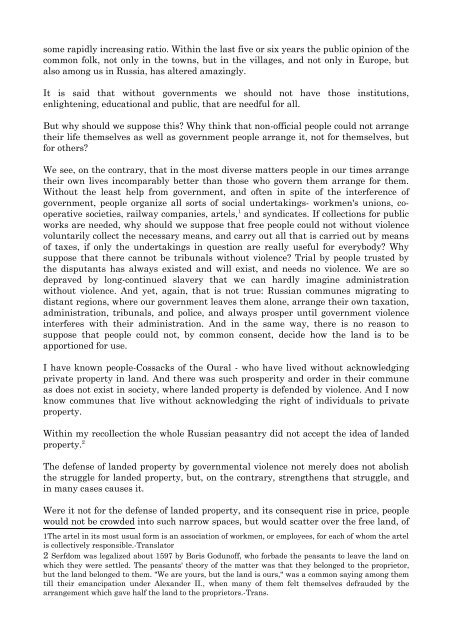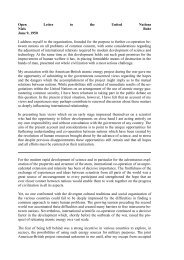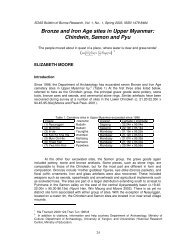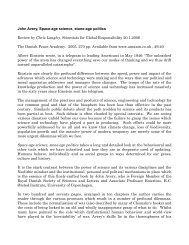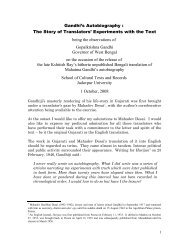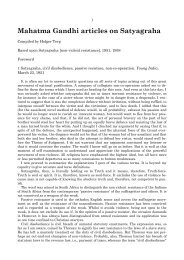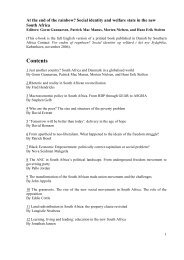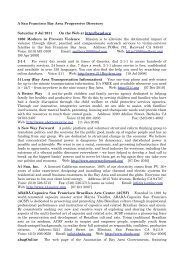THE SLAVERY OF OUR TIMES PREFACE / INTRODUCTION
THE SLAVERY OF OUR TIMES PREFACE / INTRODUCTION
THE SLAVERY OF OUR TIMES PREFACE / INTRODUCTION
Create successful ePaper yourself
Turn your PDF publications into a flip-book with our unique Google optimized e-Paper software.
some rapidly increasing ratio. Within the last five or six years the public opinion of the<br />
common folk, not only in the towns, but in the villages, and not only in Europe, but<br />
also among us in Russia, has altered amazingly.<br />
It is said that without governments we should not have those institutions,<br />
enlightening, educational and public, that are needful for all.<br />
But why should we suppose this? Why think that non-official people could not arrange<br />
their life themselves as well as government people arrange it, not for themselves, but<br />
for others?<br />
We see, on the contrary, that in the most diverse matters people in our times arrange<br />
their own lives incomparably better than those who govern them arrange for them.<br />
Without the least help from government, and often in spite of the interference of<br />
government, people organize all sorts of social undertakings- workmen's unions, cooperative<br />
societies, railway companies, artels, 1 and syndicates. If collections for public<br />
works are needed, why should we suppose that free people could not without violence<br />
voluntarily collect the necessary means, and carry out all that is carried out by means<br />
of taxes, if only the undertakings in question are really useful for everybody? Why<br />
suppose that there cannot be tribunals without violence? Trial by people trusted by<br />
the disputants has always existed and will exist, and needs no violence. We are so<br />
depraved by long-continued slavery that we can hardly imagine administration<br />
without violence. And yet, again, that is not true: Russian communes migrating to<br />
distant regions, where our government leaves them alone, arrange their own taxation,<br />
administration, tribunals, and police, and always prosper until government violence<br />
interferes with their administration. And in the same way, there is no reason to<br />
suppose that people could not, by common consent, decide how the land is to be<br />
apportioned for use.<br />
I have known people-Cossacks of the Oural - who have lived without acknowledging<br />
private property in land. And there was such prosperity and order in their commune<br />
as does not exist in society, where landed property is defended by violence. And I now<br />
know communes that live without acknowledging the right of individuals to private<br />
property.<br />
Within my recollection the whole Russian peasantry did not accept the idea of landed<br />
property. 2<br />
The defense of landed property by governmental violence not merely does not abolish<br />
the struggle for landed property, but, on the contrary, strengthens that struggle, and<br />
in many cases causes it.<br />
Were it not for the defense of landed property, and its consequent rise in price, people<br />
would not be crowded into such narrow spaces, but would scatter over the free land, of<br />
1The artel in its most usual form is an association of workmen, or employees, for each of whom the artel<br />
is collectively responsible.-Translator<br />
2 Serfdom was legalized about 1597 by Boris Godunoff, who forbade the peasants to leave the land on<br />
which they were settled. The peasants' theory of the matter was that they belonged to the proprietor,<br />
but the land belonged to them. "We are yours, but the land is ours," was a common saying among them<br />
till their emancipation under Alexander II., when many of them felt themselves defrauded by the<br />
arrangement which gave half the land to the proprietors.-Trans.


